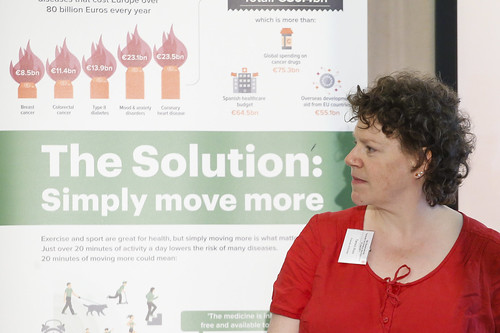
Summary
Europeans are insufficiently active, resulting in more than half a million deaths a year – and possibly worse consequences in future, according to the report “The economic costs of physical inactivity in Europe” by the Centre for Economics and Business Research (CEBR) presented at a Friends of Europe Café Crossfire debate on 17 June.
“Inactivity is a health problem that stores up problems for the future,” said Vicky Pryce, lead author of the study. “It isn’t static. If we don’t get people moving now then physical inactivity is going to pose a greater risk than now.” The report showed that a quarter of European adults and four in five adolescents are insufficiently active, and that inactivity costs €80bn a year to EU member states through coronary heart disease, type II diabetes, colorectal cancer and breast cancer.
Electorates are typically concerned about financing ways to fix the problem resulting from inactivity, such as healthcare. So governments are often less interested in funding programmes that would get people moving more, even though these are less costly, said Mogens Kirkeby, President of the International Sport and Culture Association (ISCA). “On the political side, we know that preventive actions are not very attractive,” he said. “Cures are very attractive. But prevention is more fun – and cheaper.”
Bringing just one fifth of currently inactive Europeans up to the recommended levels of activity would yield benefits worth up to €16bn according to the CEBR study. Highlighting the economic potential for sport could make it more attractive to promote activity, said MEP Seán Kelly, Founding Executive Chairman of the Irish Institute of Sport. “The sector has strong potential to contribute to jobs,” he said. “If you bring the economic factors in, you can make it more relevant.”
About
Europeans must get moving to become healthy, wealthy and wise. It’s true: being physically active improves physical and mental health, reduces the risk of all-cause mortality, leads to greater life satisfaction and makes people more productive. But the message isn’t really getting through. It is estimated that 25% of European adults and 80% of European adolescents are insufficiently active. Young people, while enjoying better health than ever before, are failing to achieve full-potential activity levels.
What’s needed to get Europeans on their feet? How does physical inactivity impact on European society and the economy? Can physical activity be made more central to people’s lives? Is there a role for governments? Now that sport is in the EU Treaty, what’s the European Commission’s plan?
IMAGE CREDITS: CC / FLICKR – Kmeron
Schedule
Europeans must get moving to become healthy, wealthy and wise. It’s true: being physically active improves physical and mental health, reduces the risk of all-cause mortality, leads to greater life satisfaction and makes people more productive. But the message isn’t really getting through. It is estimated that 25% of European adults and 80% of European adolescents are insufficiently active. Young people, while enjoying better health than ever before, are failing to achieve full-potential activity levels.
What’s needed to get Europeans on their feet? How does physical inactivity impact on European society and the economy? Can physical activity be made more central to people’s lives? Is there a role for governments? Now that sport is in the EU Treaty, what’s the European Commission’s plan?
With
Seán Kelly
Member of the European Parliament and Founding Executive Chairman of the Irish Institute of Sport
Mogens Kirkeby
President of the International Sport and Culture Association (ISCA)
Vicky Pryce
Joint Head of the UK’s Government’s Economic Service (2007-2010) and lead author of the CEBR study “The economic costs of physical inactivity in Europe”
James Quincey
President of The Coca-Cola Company’s Europe Group
Antonio Silva Mendes
European Commission Director for Youth and Sport
Moderated by
Tamsin Rose
Facilitator
Speakers
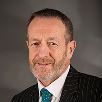
Member of the European Parliament and Founding Executive Chairman of the Irish Institute of Sport
Prior to being elected to the European Parliament in 2009, Kelly spent three years as President of the Gaelic Athletic Association and subsequently became the Founding Executive Chairman of the Irish Institute of Sport in 2006. The aim of the institute is to create an environment that influences, supports and ensures that talented Irish athletes will achieve sustained levels of excellence in elite sport.
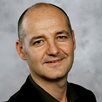
President of the International Sport and Culture Association (ISCA)
With a Master of Science in Recreational Sport Management, Kirkeby became Secretary General of the International Sport and Culture Association (ISCA) in 1998 and President in 2007. In this role, he has been integral to the development and promotion of the campaign to get “100 million more physically active Europeans in 2020” for which he has succeeded in generating support from both the European Commission and the European Parliament.

Joint Head of the UK’s Government’s Economic Service (2007-2010) and lead author of the CEBR study “The economic costs of physical inactivity in Europe”
Pryce has had a long and impressive career as an economist. Starting out in the private sector, she was Chief Economist at KPMG and Senior Managing Director at FTI Consulting. She later moved to the UK Department for Business, Innovation and Skills where she rose to Director-General for Economics. In addition to time spent teaching at universities, she has published a book discussing the Eurozone crisis entitled “Greekonomics”.
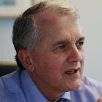
European Commission Director for Youth and Sport
Prior to joining the European Commission in 1990, Silva Mendes was a professor at the University of Lisbon for ten years. In his current position, he is responsible for developing the European dimension in sport and maximising the well-being and potential of young people in the Directorate General for Education and Culture, which aims, among others, to increase citizens’ participation in physical activities.

President of The Coca-Cola Company’s Europe Group
Quincey joined the Coca-Cola Company in the USA in 1996, holding leadership positions in Central and South America before moving back to Europe. As head of the Europe Group, he is in charge of all of Coca-Cola’s operations across 38 European countries, including the member states of the European Union, the European Free Trade Association countries and the Balkans.

Facilitator
Tamsin Rose is a facilitator who was until recently a senior fellow for health at Friends of Europe. Having studied international relations, she has 25 years of experience working across the European continent from Ireland to Mongolia. A natural communicator, Tamsin has been a radio reporter, worked on press for the EU Delegation in Moscow and is currently a member of the external speaker team for the European Commission Directorate-General for Communication, describing how the EU works and key policies to visitor groups from around the world. Since 2002, she has specialised in public health and public participation issues, serving as the Secretary General of the European Public Health Alliance (EPHA), and providing strategic advice for health groups on how to engage successfully with the EU.
Activities
Europe's moment: advancing clinical research and health innovation
Next event In person & online

- Area of Expertise
- Sustainable Livelihoods
Re-imagining Europe's health systems
Past event In person & livestreamed

- Area of Expertise
- Sustainable Livelihoods
Health check for a competitive medical technology sector in Europe
Past event In person

- Area of Expertise
- Sustainable Livelihoods
Healthy ageing for Europe's future: the value of adult immunisation
Past event In person & livestreamed

- Area of Expertise
- Sustainable Livelihoods
Policy Voices | Re-imagining Europe’s health systems
- Category
- Podcast
- Area of Expertise
- Sustainable Livelihoods
Financing the green and just transition: towards further partnerships…
- Category
- #CriticalThinking
- Author
- By Sebastián Nieto-Parra
Reclaiming medicines and health innovation for our health
- Category
- #CriticalThinking
- Author
- By Els Torreele
Hidden biases in public health research: why we are failing our most…
- Category
- #CriticalThinking
- Author
- By Marthe De Boevre

- Area of Expertise
- Sustainable Livelihoods

- Area of Expertise
- Sustainable Livelihoods

- Area of Expertise
- Sustainable Livelihoods
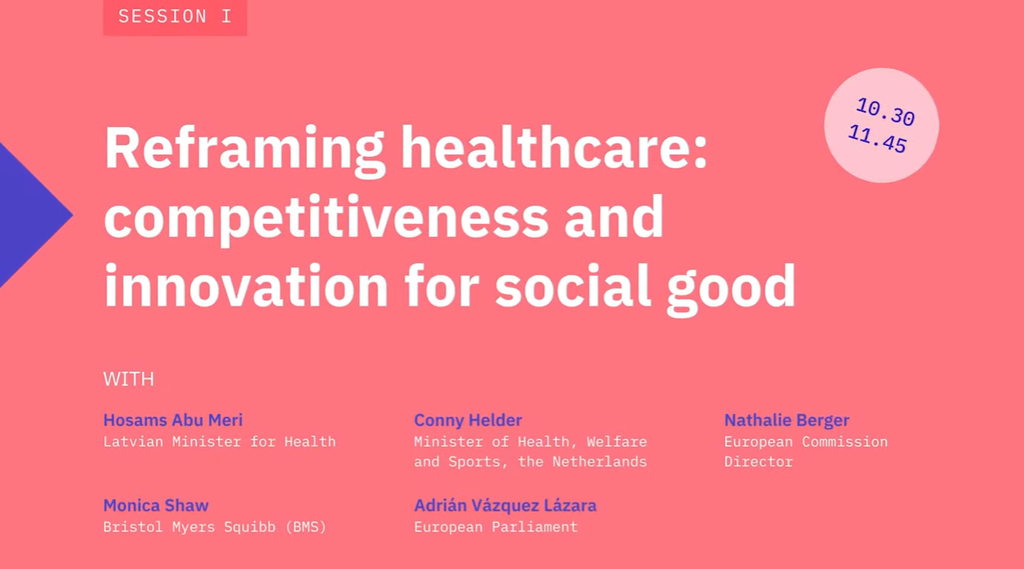
- Area of Expertise
- Sustainable Livelihoods
Continue
the debate on
- Debating Europe
